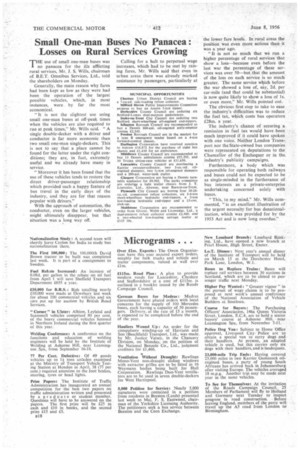Small One-man Buses No Panacea : Losses on Rural Services Growing
Page 100

If you've noticed an error in this article please click here to report it so we can fix it.
THE use of small one-manbuses was no panacea for the ills afflicting rural services, Mr. J. S. Wills, chairman of B.E.T. Omnibus Services, Ltd., told the shareholders on Monday.
Generally, the main reason why fares had been kept as low as they were had been the operation of the largest possible vehicles, which, in most instances, were by far the most economical.
" It is not the slightest use using small one-man buses at off-peak times when the vehicles arc also required to run at peak times," Mr. Wills said. "A single double-decker with a driver and conductor is far more economic than two small one-man single-deckers. This is not to say that a place cannot be found for the latter under the right conditions; they are, in fact, extremely useful and we already have many in service.
"Moreover it has been found that the use of these vehicles tends to restore the direct driver-passenger relationship which provided such a happy feature of bus travel in the early days of the industry, and they are for that reason popular with drivers."
With the approach of automation, the conductor, even on the larger vehicles, might ultimately disappear, but that situation was a long way off.
Calling for a halt to perpetual wage increases, which had to be met by raising fares, Mr. Wills said that even in urban areas there was already marked resistance by passengers, particularly at the lower fare levels. In rural areas the positiOn.was even more serious than it was a year ago.
"It is not so much that we run a higher percentage of rural services that show a loss—because even before the last war the percentage of these services was over 50—but that the amount of the loss on each service is so much. greater. The same service Which before the war showed a loss of, say, 2d. per car-mile (and that could be substantial) is now quite likely to show a loss of Is. or even more," Mr. Wills pointed out
The obvious first step to take to ease the industry's difficulties was to reduce the fuel tax, which costs bus operators £28m. a year.
The industry's chance of securing a remission in fuel tax would have been much improved if it could have spoken with one voice. Neither London Transport nor the State-owned bus companies were represented on deputations to the Chancellor of the Exchequer or in the_ industry's publicity campaigns.
Furthermore, a body which was responsible for operating both railways and buses could not be expected to be as single-minded in the furtherance of bus interests as a private-enterprise undertaking concerned solely with buses.
"This, to my mind," Mr. Wills commented, " is an excellent illustration of the urgent necessity for bus denationalization, which was provided for by the 1953 Act and is now long overdue."




















































































































































